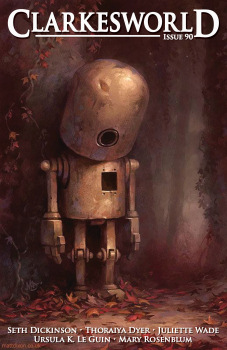 Clarkesworld #90, March 2014
Clarkesworld #90, March 2014
Reviewed by Michelle Ristuccia
A thought-provoking issue of Clarkesworld that takes calculated risks.
“Morrigan in the Sunglare” by Seth Dickinson tells the story of two soldiers facing death on a spaceship falling into the sun. Laporte, the main character, contemplates her history with Simms, her captain, and the state of her soul as a “born killer.” Dickinson regales the reader with an intricate balance of romance, character study, and philosophy. Although the introductory scene contains some unclear character references (hint: there are only two important characters), the ending scene tops off with a poignant last line.
“Human Strandings and the Role of the Xenobiologist” by Thoraiya Dyer presents the reader with two intersecting narratives; first, of a girl who is stranded on an alien planet and then returned to a changed Earth, and second, of the aliens who find and return her. Kelly, the girl, grows up on the unpleasant alien planet and then finds herself launched back to an equally unpleasant Earth controlled by the Unity AI. Jid and Sil, the aliens who find her, assume the roles of xenobiologists, investing themselves in Kelly and in human kind’s future. The two parallel narratives give each other broader context and perspective that should satisfy readers who love character and plot equally. Dyer’s story imparts a healthy sense of wonder and fear in a future setting.
“Suteta Mono de wa Nai (Not Easily Thrown Away)” by Juliette Wade is a fantasy that follows Kitano Naoko’s struggle to study for the entrance exams while fending off a mental breakdown. When Kitano meets two yokai (spirits) assembled from garbage, she fears she’s lost the battle for her future and her sanity. Interacting with the spirits brings Kitano closer to the spirit world and closer to losing her human soul. Juliette Wade intersperses Japanese vocabulary in a smart, understandable way that enhances the authentic feel of the piece without hindering comprehension. The format and progression of the story are handled expertly, from the mention of “Adults day” as a coming-of-age reference, to obaa-chan (grandma)’s advice in the last scene.
Michelle Ristuccia enjoys slowing down time in the middle of the night to read and review speculative fiction, because sleeping offspring are the best inspiration and motivation. You can find out more about her other writing projects and geeky obsessions by visiting her blog.